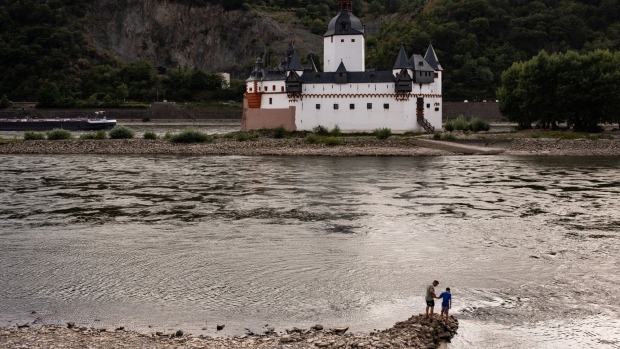Aug 10, 2022
Rhine River Withers to Crisis Level as Europe Thirsts for Energy
, Bloomberg News

(Bloomberg) -- The Rhine River is set to become virtually impassable at a key waypoint in Germany, as shallow water chokes off shipments of energy products and other industrial commodities along one of Europe’s most important waterways.
The marker at Kaub, west of Frankfurt, is forecast to drop to the critical depth of 40 centimeters (just under 16 inches) early on Aug. 12, according to the German Federal Waterways and Shipping Administration. At that level, most barges that haul goods from diesel to coal are effectively unable to transit the river. It’s set to continue dropping, to 37 centimeters the following day.
Europe is facing its worst energy crisis in decades as Russia curbs natural gas flows, with regional tensions high over its invasion of Ukraine. That’s sent prices soaring and pushed companies to use more oil and coal instead. The energy crunch has spilled over into the broader economy, sending factory costs surging and threatening to push some of the continent’s largest economies into recession.
While some barges will still be able to navigate the Rhine at Kaub, the dwindling water level illustrates how a climate crisis is compounding the region’s energy woes. Benchmark German power prices jumped to a new record on Wednesday. European natural gas and coal futures also surged.
Read: Europe’s Rivers Run Dry, Disrupting $80 Billion in Trade Routes
Used by vessels to haul vital commodities, the Rhine snakes about 800 miles (1,300 kilometers) from its source high in the Swiss Alps through some of Europe’s most important industrial zones before emptying into the North Sea near Rotterdam. Companies including chemicals giant BASF SE and steelmaker Thyssenkrupp AG rely on the river to supply major industrial plants with fuels and raw materials.
“If levels at Kaub drop to 35-55 centimeters in the next two weeks, some barges won’t be able to cross the Rhine at all, while others would carry less cargo,” BASF said Wednesday.
A mix of glacial run-off and rain feeds the river, but contributions from glaciers have dwindled in recent years as summer melting outpaces winter ice formation due to climate change. Below-average snowfall last winter and continued glacial attrition mean the waterway is particularly likely to fall to crisis levels, according to Switzerland’s federal weather service.
When the marker at Kaub hits 40 centimeters or less, it becomes uneconomical for most barges to sail any further, according to Germany’s Federal Institute of Hydrology. That effectively halts the flow of most shipments beyond the waypoint.
Barges are still passing the river at Kaub, an official from the WSA, the German state waterways agency, said Wednesday by phone. He expects the vessels to continue to operate until the Kaub marker drops by about 20 centimeters from current levels.
Further downriver -- at Duisburg, near Cologne -- the level is at 172 centimeters, with 150 centimeters seen as the threshold that makes it uneconomical to transport materials like coking coal and iron ore by barge.
The measured water level isn’t the actual depth of the river, but rather a marker for navigability. Shipments have already been hampered for weeks, with low water limiting how much barges can carry. The rate to haul some fuel to Basel in Switzerland is now 267 euros ($276) a ton, compared with about 25 euros a ton in early June, data from Insights Global show.
The low levels could cause planning headaches for utilities like EnBW AG and Uniper SE -- the latter of which recently received a $17 billion bailout from the German government to prevent a collapse of its energy network.
Grosskraftwerk Mannheim AG, which operates one of the country’s biggest coal-fired power plants, said that while shipments are currently restricted, enough coal is stockpiled at the facility to continue power generation for several weeks.
Companies will still be able to supply factories and power plants by road or rail, but those modes of transport are significantly more expensive, leading to a squeeze on margins.
“Railway capacities are not sufficient to compensate for missing barges,” said Juergen Osterhage, managing director for the German Coal Importers Association.
(Updates with industry comments from sixth paragraph.)
©2022 Bloomberg L.P.






